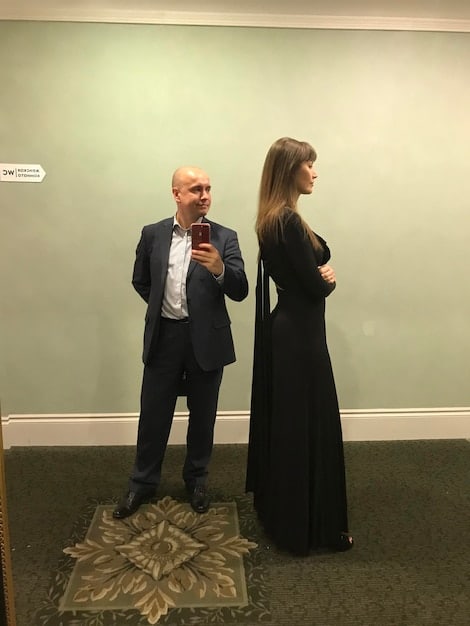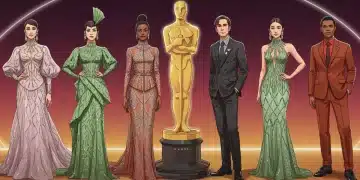The Evolution of Award Show Hosts: From Traditional to Modern

The evolution of award show hosts showcases a shift from formal, controlled presenters to more relatable, comedic personalities who engage with the audience and adapt to the changing media landscape.
Award shows have always been a staple of entertainment, and a key element of their success lies in the selection of a charismatic and engaging host. The role of the award show host has transformed significantly over the years, adapting to societal changes, technological advancements, and evolving audience expectations. This article delves into the evolution of award show hosts: from traditional to modern, exploring key figures, defining moments, and the factors that have shaped this fascinating journey.
The Golden Age of Traditional Hosts
The early days of award shows were characterized by a sense of formality and reverence. Hosts were primarily selected for their eloquence, poise, and ability to maintain a smooth, predictable broadcast. This era saw the rise of iconic figures who set the standard for what an award show host should be.
Johnny Carson: The King of Late Night
Johnny Carson, best known for his long tenure as the host of “The Tonight Show,” also hosted the Academy Awards multiple times. His style was marked by wit, charm, and a professional demeanor that resonated with audiences. He set a high bar for future hosts with his ability to deliver jokes that were both clever and accessible.
Bob Hope: The Comedic Stalwart
Bob Hope was another defining figure of this era. Hosting the Oscars a staggering 19 times, Hope brought a unique blend of self-deprecating humor and patriotic fervor to the stage. His jokes were tailored to the times, often referencing current events and political figures, making him a beloved and trusted presence.
- Eloquence and Poise: Hosts were expected to be articulate and carry themselves with grace.
- Controlled Humor: Humor was present but always kept within the bounds of good taste and respect.
- Seamless Delivery: The emphasis was on ensuring a smooth, uninterrupted broadcast.
In conclusion, the traditional era of award show hosting was defined by hosts who embodied professionalism, eloquence, and a respectful approach to humor. Figures like Johnny Carson and Bob Hope set a standard that future hosts would both emulate and challenge.
The Shift Towards Relatability and Authenticity
As societal norms evolved, so did the expectations for award show hosts. Audiences began to favor hosts who were more relatable, authentic, and willing to engage with contemporary issues. This shift marked the beginning of a new era in award show hosting, where personality and connection became paramount.
Billy Crystal: Blending Tradition with Modernity
Billy Crystal emerged as a transitional figure, bridging the gap between traditional and modern hosting styles. Known for his impersonations, musical numbers, and engaging presence, Crystal brought a level of energy and dynamism that resonated with a younger audience while still maintaining a sense of respect for the occasion.
Whoopi Goldberg: Breaking Barriers
Whoopi Goldberg broke barriers as the first African-American woman to host the Academy Awards solo. Her hosting style was marked by her signature wit, outspokenness, and willingness to address social and political issues. Goldberg brought a fresh perspective to the stage, challenging the norms of traditional award show hosting.

- Increased Authenticity: Hosts were encouraged to bring their unique personalities to the stage.
- Topical Humor: Jokes began to address current events, social issues, and pop culture trends.
- Audience Engagement: Hosts started interacting more directly with the audience, both in the theater and at home.
In summary, the shift towards relatability and authenticity saw the emergence of hosts who were more willing to be themselves, engage with contemporary issues, and connect with audiences on a personal level. Billy Crystal and Whoopi Goldberg were pivotal figures in this transition.
The Rise of Comedic Hosts
The demand for more entertainment and humor-driven award shows ushered in an era of comedic hosts. Comedians, known for their quick wit and ability to generate laughter, became increasingly popular choices to lead these events. Their goal was to keep the audience entertained and engaged throughout the night.
Chris Rock: Unfiltered Commentary
Chris Rock is known for his unfiltered and often controversial commentary. Hosting the Oscars in 2005 and 2016, Rock tackled issues of race and representation in Hollywood head-on. His willingness to address uncomfortable truths made for a memorable, albeit polarizing, hosting experience.
Ricky Gervais: The Provocateur
Ricky Gervais is known for his unapologetic and often edgy humor. Hosting the Golden Globes multiple times, Gervais pushed the boundaries of what was considered acceptable, delivering jokes that were both hilarious and offensive. His controversial style generated significant buzz and debate.
- Edgy Humor: Hosts were given more leeway to push the boundaries of comedy.
- Social Commentary: Humor was often used as a vehicle for social and political commentary.
- Unpredictability: Comedic hosts brought an element of unpredictability to the stage.
In conclusion, the rise of comedic hosts brought a new level of entertainment and engagement to award shows. Figures like Chris Rock and Ricky Gervais challenged the norms of traditional hosting, using humor to address social issues and provoke thought.
The Influence of Digital and Social Media
The advent of digital and social media has profoundly influenced the role of award show hosts. Hosts are now expected to be tech-savvy, engaging with audiences online, and incorporating social media trends into their routines. This integration has created new opportunities and challenges for hosts.
Ellen DeGeneres: The Queen of Social Media
Ellen DeGeneres is celebrated for her inclusive humor and social media savvy. Her iconic selfie at the 2014 Oscars, which broke records for the most retweeted photo, demonstrated the power of social media integration. DeGeneres effectively used social media to connect with audiences and create memorable moments.
Jimmy Kimmel: Mastering the Art of Viral Moments
Jimmy Kimmel is known for his ability to create viral moments that resonate with online audiences. Hosting the Oscars multiple times, Kimmel has incorporated Twitter, memes, and other social media trends into his routines. His approach highlights the importance of staying current and engaging with digital culture.

- Social Media Integration: Hosts are expected to use social media to engage with audiences.
- Viral Moments: Creating shareable content has become a key goal for hosts.
- Real-Time Interaction: Hosts often respond to social media comments and trends during the broadcast.
In summary, the influence of digital and social media has transformed the role of award show hosts, requiring them to be tech-savvy, engaging, and capable of creating viral moments. Ellen DeGeneres and Jimmy Kimmel exemplify this new era of hosting.
Navigating Controversy and Social Responsibility
Award shows have increasingly become platforms for addressing social and political issues. Hosts are now expected to navigate sensitive topics with grace, awareness, and a sense of responsibility. This expectation adds a layer of complexity to their role, requiring them to balance entertainment with advocacy.
Amy Schumer, Wanda Sykes, and Regina Hall: Addressing Gender Inequality
The trio hosted the 2022 Oscars, addressing gender inequality and other social issues with humor and candor. Their combined approach allowed them to tackle sensitive topics from multiple perspectives, creating a powerful and impactful hosting experience.
Chelsea Handler: Using Humor for Advocacy
Chelsea Handler has used her platform to advocate for various social and political causes. Hosting award shows and other events, Handler has consistently used humor to raise awareness and promote dialogue on important issues.
- Social Awareness: Hosts are expected to be knowledgeable about current social and political issues.
- Balanced Approach: The challenge is to address sensitive topics without alienating the audience.
- Authenticity and Sincerity: Audiences value hosts who speak from the heart and demonstrate genuine concern.
In conclusion, navigating controversy and social responsibility has become an essential aspect of modern award show hosting. Hosts like Amy Schumer, Wanda Sykes, Regina Hall and Chelsea Handler exemplify the ability to use their platform for advocacy while maintaining a sense of humor and connection with the audience.
The Future of Award Show Hosting
Looking ahead, the future of award show hosting is likely to be shaped by ongoing technological advancements, evolving audience expectations, and the increasing importance of diversity and inclusion. Hosts will need to be adaptable, innovative, and committed to creating inclusive and engaging experiences for all viewers.
Virtual and Hybrid Hosting
The COVID-19 pandemic accelerated the adoption of virtual and hybrid hosting formats. As technology continues to advance, hosts may increasingly find themselves interacting with audiences and presenters remotely. This shift requires hosts to be comfortable with new technologies and able to create a sense of connection despite physical distance.
Diversity and Inclusion
The demand for greater diversity and inclusion will continue to shape the selection of award show hosts. Audiences are increasingly seeking hosts who reflect the diversity of society and who can bring unique perspectives and experiences to the stage. This trend will likely lead to more opportunities for hosts from underrepresented groups.
- Technological Adaptability: Hosts will need to be comfortable with virtual and hybrid formats.
- Inclusive Representation: Audiences will continue to demand greater diversity among hosts.
- Innovative Approaches: Hosts will need to find new ways to engage and entertain audiences.
In summary, the future of award show hosting will be defined by technological adaptability, inclusive representation, and innovative approaches to engagement. Hosts who can embrace these trends will be well-positioned to succeed in the ever-evolving world of entertainment.
| Key Aspect | Brief Description |
|---|---|
| 🎤 Traditional Hosting | Emphasized formality, eloquence, and controlled humor. |
| 🎭 Relatability Shift | Transition towards authentic, engaging, and topical personalities. |
| 📱 Social Media Impact | Hosts leverage digital platforms for audience interaction. |
| 🌍 Social Responsibility | Navigating sensitive topics with awareness and advocacy. |
FAQ
Johnny Carson and Bob Hope are considered two of the most iconic traditional award show hosts. Carson was known for his wit and professionalism, while Hope brought self-deprecating humor and patriotic fervor to the stage.
Social media has made it necessary for hosts to be tech-savvy and engaging online. They are now expected to create viral moments, interact with audiences in real-time, and incorporate social media trends into their routines.
Award shows have become platforms for addressing social and political issues, and hosts are expected to navigate these topics with grace and responsibility. Audiences value hosts who demonstrate genuine concern and use their platform for advocacy.
Modern award show hosts are defined by their relatability, authenticity, and ability to engage with contemporary issues. They are often comedic, tech-savvy, and committed to creating inclusive experiences for all viewers.
The pandemic accelerated the adoption of virtual and hybrid hosting formats. Hosts now need to be comfortable interacting with audiences and presenters remotely, using technology to maintain a sense of connection and entertainment.
Conclusion
In conclusion, the journey of award show hosts from traditional figures to modern entertainers reflects profound shifts in society, technology, and audience expectations. From the eloquence of Johnny Carson to the social media savvy of Ellen DeGeneres, each era has produced hosts who have left an indelible mark on the world of entertainment, adapting to new challenges and opportunities while continuing to entertain and engage audiences around the globe.





